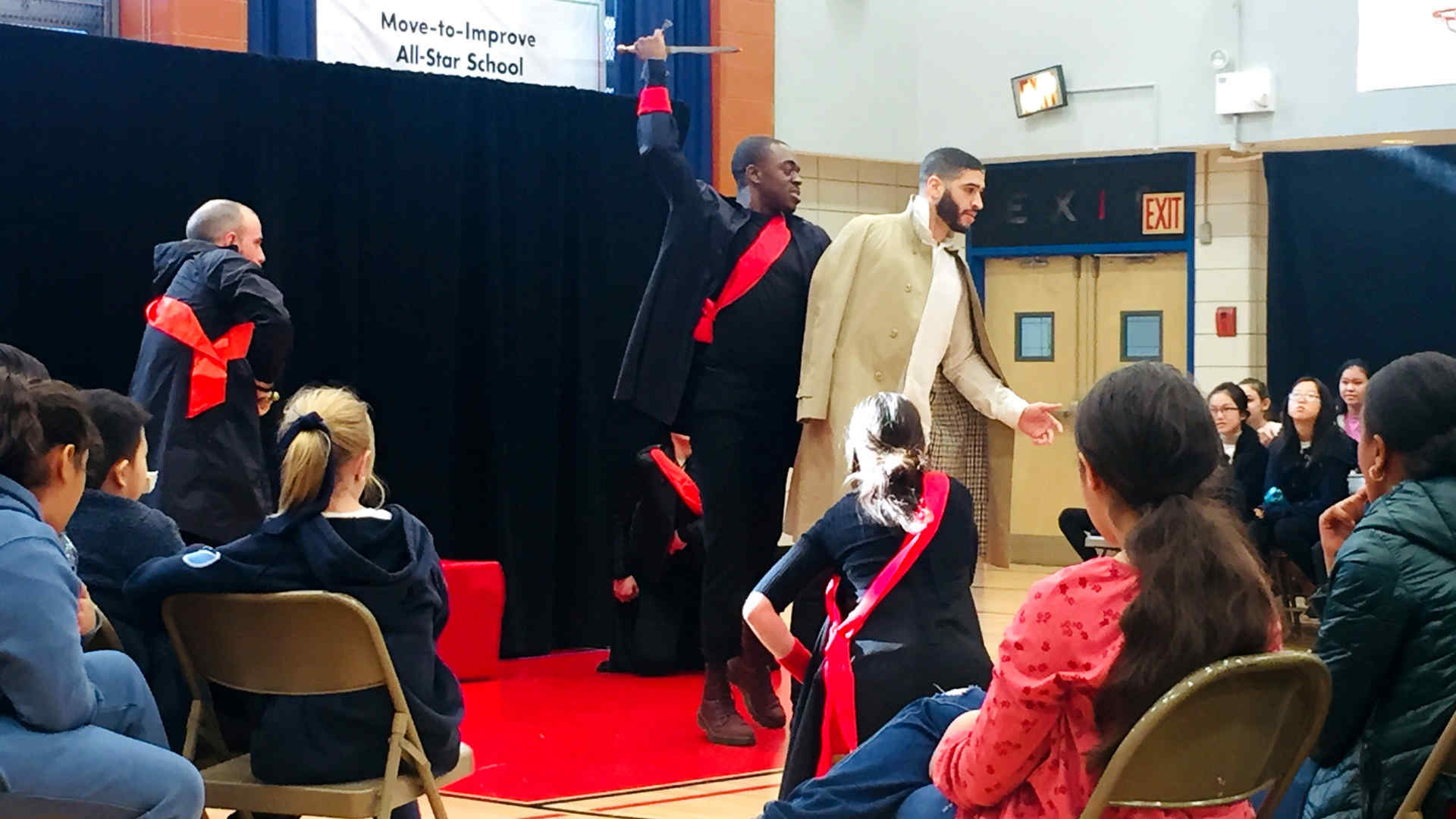
Into the Community
It is 8am on the Ides of March in ancient Rome. A surprised Julius Caesar welcomes a group of senators in his house and invites them to drink wine before heading to the Senate. As the conspirators exchange complicit looks and follow him inside, a group of middle school students in the Bronx in 2020 warns Caesar: “They’re liars.” “Those aren’t your friends.” “You’re going to die.”
There it is. For a split second, ancient Rome enters the multipurpose room of Jonas Bronck Academy in the Bronx, and middle school students in January 2020 feel the urge to change Caesar’s fate. As we leave the stage, we, a group of Juilliard second-year drama students, feel the thrill of storytelling and the beauty of connecting with younger generations through William Shakespeare’s work.
In January, for the first time in decades, Juilliard’s Drama Division teamed up with the Acting Company to tour the second-year Shakespeare rehearsal projects, Julius Caesar and Romeo and Juliet, to local schools. At this stage in our training, we’re focusing on the power of language and the actor, so these projects have minimal production elements, which make them flexible enough to adjust to any kind of space. We took our projects to auditoriums, basketball courts, and multipurpose rooms of 12 schools in Manhattan, Brooklyn, and the Bronx, sharing our work with students in 5th through 12th grade. We transcended the conservatory frontiers and connected with the community outside.
What it does for the training
The members of the Acting Company had advised us beforehand that “kids can tell when you’re not being truthful or authentic, and they’ll show it by being disinterested or talking back,” Marianna Gailus, who played Portia and other characters in Julius Caesar, said.
And there were moments when they talked over us and yawned and even fell asleep. But they also became a part of the crowd in ancient Rome. They got up and danced to the music and stuck out their hands to get high fives from the plebeians. They gasped when Casca pulled out his dagger, burst into chaotic teenage enthusiasm when Romeo and Juliet kissed, laughed at the Soothsayer, reacted to the drawing of the swords, and connected images on stage to their own reality.
Meanwhile, we felt all the technique we’ve acquired at Juilliard kick in. As Marianna observed, we sought out even more ways to activate the language to get our points across, and we also found new moments to accentuate the physical life of the play. But most importantly, we found a higher purpose for the work we were doing.
An audience worth fighting for
During our Julius Caesar rehearsals, our director, Alex Correia, kept asking us, “What are you willing to fight for?” Oluwatobiloba (Tobi) Adeyemo, who played Casca and other characters, found the answer to that question in a performance at a school in Brooklyn—in the faces of the students in the audience. “The people that I want to perform for most are the people like the ones I went to school with—kids who have a specific vibe in the way they walk, talk, and carry themselves. People who aren’t familiar with this kind of energy think it’s dangerous, but those are my people—the people that I look out for, people that I love,” he said. And these performances, he added, give “opportunities to people who normally wouldn’t get them.” Tobi also highlighted the importance for these young students of “seeing a black man on stage doing Shakespeare—it feels really good to be able to be that for them.”
For Orlando Rivera, who played Cassius, this tour was a return to his roots. When he was growing up in the Bronx, “not having access to theater was limiting because I didn’t have that outlet to express myself freely,” he said. “Knowing that you have an outlet to be someone you aren’t stretches your imagination about where you can go with your life.” Returning to his borough to bring Shakespeare to an audience that represented who he was at that age was a powerful experience. “These kids are smarter than people think they are even though they haven’t been exposed to [Shakespeare]. They still understand human behavior, possibly even more so because they’re growing up in tough neighborhoods. When they see Julius Caesar, they see human beings struggle for power and respect—the daily struggle in the streets,” he said. “It’s something to relate to.”
Gabriela Saker, who holds McKnight Foundation and Juilliard scholarships, received her bachelor’s in journalism from the University of Puerto Rico (Río Piedras) and worked as a journalist before starting her drama master’s